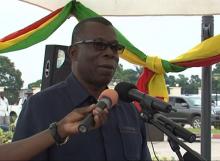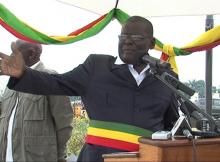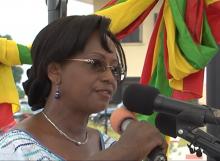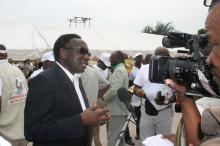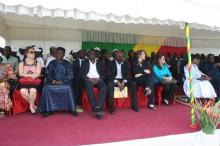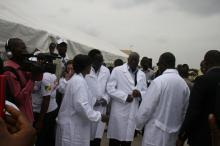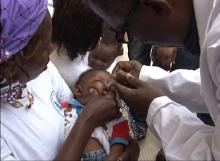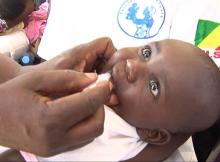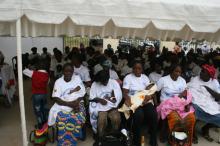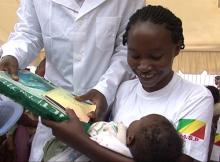African Vaccination Week gathers steam, seeks to protect millions against major killer diseases
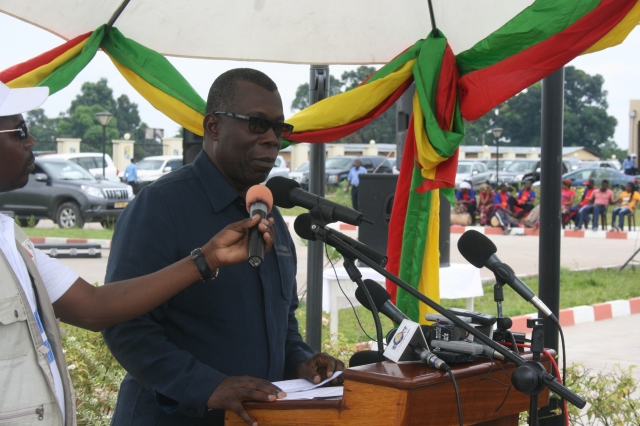 Brazzaville, 24 April 2014 –- The regional launch of the 4th African Vaccination Week (AVW) took place on Thursday in Brazzaville, although celebration of the week began in countries across the continent on Tuesday 22 April, and extends through Sunday, 27 April.
Brazzaville, 24 April 2014 –- The regional launch of the 4th African Vaccination Week (AVW) took place on Thursday in Brazzaville, although celebration of the week began in countries across the continent on Tuesday 22 April, and extends through Sunday, 27 April.
Speaking at the launch, the Minister of Health and Population of Congo, Mr Francois Ibovi, underlined the intrinsic value of vaccines as powerful, proven tools for disease prevention saying “The best medicines are the ones that prevent diseases rather than those which cure”.
Mr Ibovi, however, added: “The success of vaccination depends largely on its promotion by the media, local authorities, educators and parents. All skills and competencies must therefore be mobilized to ensure that vaccines reach the maximum number of children. Everyone has their share of responsibility”.
“I appeal in particular to health workers, and I urge them to continue to do their selfless work in order to ensure the survival of our children
Mr. Ibovi also used the occasion to announce the formal introduction of rotavirus vaccine into Congo’s immunization programme. Rotavirus is the main cause of severe diarrhoea among young children worldwide, and it kills more than 700 Congolese children under five years of age each year.
He also announced that during the week, activities related to vitamin A supplementation, distribution of long lasting impregnated treated mosquito-nets to pregnant women & children as well as sensitization on breast feeding will be conducted.
Dr Fatoumata Binta Diallo, the WHO Representative in Congo, speaking on behalf of the WHO Regional Director for Africa and other Congo’s development partners, commended the Congolese authorities for prioritizing health, as evidenced by its introduction of at least 4 vaccines –including rotavirus vaccine-- in its routine immunization programmes within the last decade. She added that during the AVW, activities to promote breastfeeding, hand washing with soap and use of potable water will also be conducted in the framework of a comprehensive approach to fight diarrhoea.
The WHO Representative pledged her Organization’s commitment to continue support to African countries in their quest to improve maternal, child and community health.
Earlier, in a message to mark the commemoration of the 4th edition of the AVW, WHO Regional Director for Africa, Dr Luis Sambo, said “By commemorating African Vaccination Week, countries are demonstrating an acute awareness of our collective vulnerability to diseases – a vulnerability which calls for shared responsibility and investment of even more resources in immunization”.
Dr Sambo urged Africans to always ensure that they were up-to-date with recommended vaccination schedules.
The theme for this year’s AVW observance is “Vaccination - a shared responsibility”, highlighting the importance of everyone doing their part in supporting immunization, one of public health’s most important and cost-effective interventions.
This week, health authorities in several countries have been carrying out launches and immunization activities, including vaccination against polio, measles, rubella, diphtheria, whooping cough, neonatal tetanus, influenza, yellow fever, rotavirus, bacterial pneumonia, and human papillomavirus.
They are also providing other lifesaving interventions such as deworming, vitamin A supplementation, LLITNs distribution, growth monitoring, cancer screening, among others.
African Vaccination Week is one of the largest international health efforts in Africa. Since 2011, it has taken the benefits of vaccines to several hundred million people of all ages, helping to reduce gaps created by inequitable access to immunization services. The initiative also promotes communication and cooperation between countries and helps keep immunization high on the regional and national political agendas.
As a technical cooperation agency, WHO supports Member States in organizing and carrying out AVW, including planning, resource mobilization, evaluation and documentation of activities.



